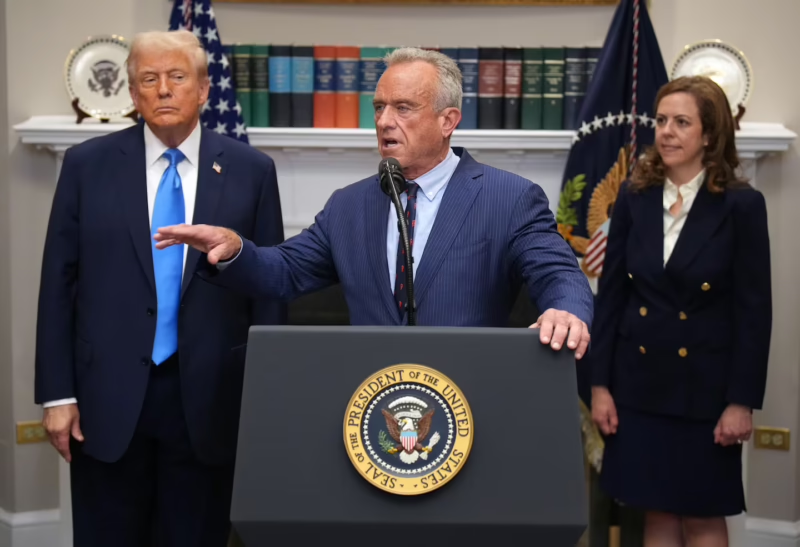Big news is swirling around autism research, and it has parents, doctors, and advocates paying attention. For years, families have asked why autism rates keep climbing and what can be done to help children thrive. Now, two new developments may offer clues and hope. While these findings remain preliminary, they carry real promise.
The Possible Link Between Tylenol and Autism
President Donald Trump and U.S. health officials point to studies that suggest a possible connection between acetaminophen (best known as Tylenol) use during pregnancy and a higher risk of autism in children. They allege that expectant mothers who take large amounts of acetaminophen may unknowingly increase the odds of autism or ADHD in their children.
God bless you, President Trump, for being brave. pic.twitter.com/E9Hweu8d2Y
— Secretary Kennedy (@SecKennedy) September 22, 2025
This theory is based on several long-running studies, including the Boston Birth Cohort and the Nurses’ Health Study. Researchers reported patterns that seem to connect prenatal acetaminophen use with later developmental challenges. Officials like FDA Commissioner Marty Makary say the data are “too strong to ignore.”
Of course, not everyone agrees. Tylenol’s manufacturer, Kenvue, disputes the claims, saying sound science does not prove a causal link. Tylenol made a statement on its website:

Many independent doctors also warn that much more research is needed before conclusions are drawn. Still, the fact that this conversation is now on the national stage could mark a turning point. It signals that researchers may finally be on to something about one of the many possible contributors to autism. (MORE NEWS: Gen Z Credit Scores Drop, But Future Looks Bright)
Trump Raises Concerns on Childhood Vaccinations
President Trump also brought to light another issue he believes deserves national attention: childhood vaccinations. Trump warned against over-vaccinating babies and young children, saying, “It’s too much liquid, too many different things are going into that baby at too big a number the size of this thing. When you look at it, it’s like 80 different vaccines and beyond vaccines, 80, and you give that to a little kid.”
Secretary Robert F. Kennedy Jr. echoed those concerns, emphasizing that families deserve to be heard. “Some 40-70% of mothers who have children with autism believe that their child was injured by a vaccine. President Trump believes that we should be listening to these mothers instead of gaslighting and marginalizing them like prior administrations.”
“Some 40-70% of mothers who have children with autism believe that their child was injured by a vaccine. President Trump believes that we should be listening to these mothers instead of gaslighting and marginalizing them like prior administrations.” – @SecKennedy pic.twitter.com/491tqIpgKy
— The White House (@WhiteHouse) September 23, 2025
The comments highlight a larger debate about medical freedom, parental choice, and how government agencies handle vaccine schedules for children. Both Trump and Kennedy framed the issue as one of respect for parents and accountability from institutions that have too often dismissed their voices.
A Cancer Drug May Offer New Hope
The second development is even more uplifting for families already living with autism. A cancer drug called leucovorin, long used for anemia and chemotherapy support, is now being tested for new purposes. Early studies show that leucovorin may help non-verbal children with autism begin to speak, improve social skills, pay attention longer, and reduce repetitive behaviors.
Doctors who have studied leucovorin in this new context are calling the results encouraging. Imagine a child who has never spoken a word suddenly beginning to form sentences after treatment. Parents in early studies have reported exactly that.
To be clear, leucovorin is not yet approved by the FDA for autism treatment. Right now, doctors can only prescribe it “off-label.” But regulators are already reviewing evidence and have hinted they may update the drug label to reflect potential use in speech-related deficits tied to autism. That would be a major step forward.
The Autism Action Plan: A Three-Part Strategy
The White House also laid out a structured Autism Action Plan that signals a serious national commitment. The plan focuses on three major steps.
- Informing Doctors and Families
The FDA will issue a physician notice and update safety labels on acetaminophen, citing a potential association between prenatal use and adverse neurodevelopmental outcomes. The Department of Health and Human Services will also launch a nationwide campaign to educate families and protect public health. - Making a Therapeutic Available
The FDA will recognize leucovorin as the first therapeutic for children with cerebral folate deficiency and autistic symptoms. Once approved, state Medicaid programs will be able to cover leucovorin for autism spectrum disorder. At the same time, the National Institutes of Health will conduct confirmatory trials to better understand its impact. - Increasing Research Investment
Through the Autism Data Science Initiative, the NIH will invest more than $50 million to fund 13 new projects. These efforts are designed to push forward understanding, therapies, and long-term solutions for autism.
Rep. Mary Miller weighs in on this bold plan:
For decades, politicians ignored the rise of autism in America. President Trump is taking action.
His Autism Action Plan will inform parents, expand treatment, and fund research, finally delivering answers families have needed for years.
This is the leadership we prayed for! pic.twitter.com/qAMxd2xTDM
— Rep. Mary Miller (@RepMaryMiller) September 22, 2025
Why Families Should Pay Attention
This is where the story gets exciting. Autism affects about one in 31 eight-year-olds, according to the CDC. That’s a big jump compared to past decades. Parents, teachers, and doctors have worked tirelessly to adapt, but the need for answers is growing. With support now coming directly from the Trump administration, there is new momentum to get to the bottom of things. That support could move the needle forward on both research and practical help for families.
For years, much of the focus has been on behavioral therapies and classroom strategies. Those tools help, but they don’t address the underlying biology. Now, with possible environmental links like acetaminophen and vaccines and potential medical treatments like leucovorin, science may finally be uncovering deeper layers of the puzzle. The combination of federal backing, new studies, and potential treatments offers fresh hope that families may soon see meaningful breakthroughs.
Proceeding with Caution, but Staying Hopeful
It’s important to strike a balance between caution and optimism. Even the hint of new treatments offers hope to families who have long felt overlooked. The possibility of helping children speak for the first time is not something to dismiss lightly. For many parents, even small breakthroughs are life-changing. (MORE NEWS: Protect Your Home Like Family: Smart Budgeting Tips)
We may be witnessing the start of a new chapter. Autism has always been complex, with many possible causes and no single solution. But the growing willingness of leaders, researchers, and regulators to dig into controversial areas suggests progress. By shining a light on risks and promising treatments, they are opening doors that could lead to better answers.
For now, the best step is to stay informed, keep expectations realistic, and support continued research. If these findings hold up, they could redefine how we think about autism for generations to come.
The Takeaway
For the first time in years, families can sense real momentum. President Trump and his administration are not just acknowledging the concerns of parents — they are putting weight and resources behind the effort to find answers. From raising questions about acetaminophen and vaccine schedules to pushing forward a promising cancer drug and launching a national Autism Action Plan, this moment feels different.
For parents who have spent years feeling dismissed or ignored, this support matters. It signals that the federal government is finally listening and willing to take bold steps, even on controversial topics. That commitment could move the needle on research, funding, and therapies in ways that make a tangible difference for children and families.
The journey is far from over, and much of the science remains preliminary. Still, there is renewed energy, stronger leadership, and a willingness to explore every possible path. That combination is what gives families hope. If these efforts continue, the next chapter in autism care could be one defined not by frustration, but by breakthroughs, healing, and help.
Expose the Spin. Shatter the Narrative. Speak the Truth.
At The Modern Memo, we don’t cover politics to play referee — we swing a machete through the spin, the double-speak, and the partisan theater.
While the media protects the powerful and buries the backlash, we dig it up and drag it into the light.
If you’re tired of rigged narratives, selective outrage, and leaders who serve themselves, not you — then share this.
Expose the corruption. Challenge the agenda.
Because if we don’t fight for the truth, no one will. And that fight starts with you.


